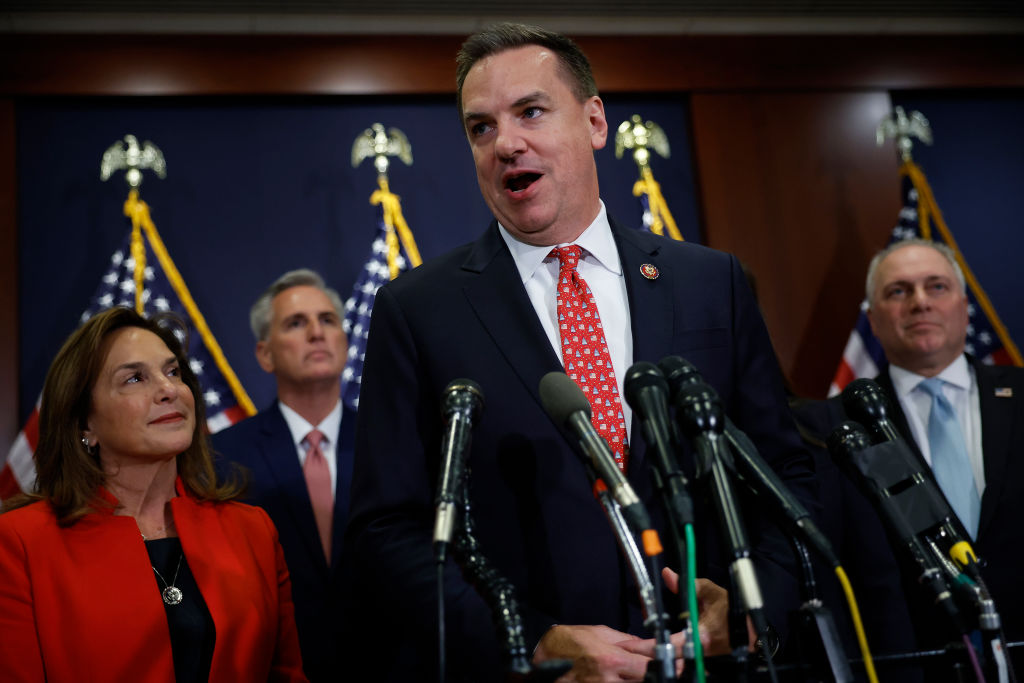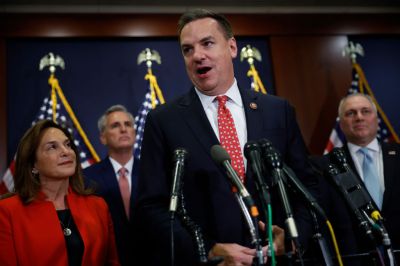Nearly a month after a lackluster midterm showing, House Republicans are still wrestling with where they erred, whether they can govern with such a slim majority, and how to better manage voters’ expectations moving forward. They’re hoping a Republican National Committee postmortem will help correct a campaign strategy that failed to flip more seats this year despite record-high inflation and an unpopular Democratic president.
Following next week’s Senate runoff in Georgia the RNC is expected to begin work on a post-midterm review identifying “where the party excelled and where we need to improve, especially in the clear underperformance among independent voters that we saw,” according to a letter RNC Chair Ronna McDaniel wrote to committee members last month. The contents of the note were first reported by Politico.
That midterm postmortem will likely delve into a number of Republican weaknesses—from candidate quality and mail-in voting to minority outreach and the GOP’s abortion messaging in a post-Roe. v. Wade world.
Top of mind for House Republican campaign strategists will be assessing how so many Democrats in swing districts managed to survive a tough national environment. Democratic Reps. Abigail Spanberger of Virginia, Elissa Slotkin of Michigan, and Susan Wild of Pennsylvania, for example, all held their seats despite appearing vulnerable. Republican leaders will also ask how they failed to win more open seats in this environment.
In Colorado, state GOP Chair Kristi Burton Brown had no doubt that Republicans would win the state’s newly drawn 8th Congressional District, widely considered a tossup. “Barbara Kirkmeyer will be the congresswoman from the new CD-08. And that’s a swing district,” Burton Brown said in an early November interview at Colorado GOP headquarters.
But optimism wasn’t enough. Kirkmeyer got close, losing to Democrat Yadira Caraveo by less than a point. And that came after a combined $7 million in outside Republican ad spending from the National Republican Congressional Committee (NRCC) and House Minority Leader Kevin McCarthy’s leadership fund.
Kirkmeyer’s loss is a representative example. “It’s safe to say we were disappointed with the way it turned out, but we certainly are excited to have the opportunity to be in the majority now,” said GOP Rep. Richard Hudson, the House GOP conference’s secretary elected this month to serve as next cycle’s NRCC chairman.
But that slim majority is a nightmare for McCarthy, who spent the entire cycle predicting a red tsunami that could surpass even the 2010 Tea Party wave when Democrats lost 63 seats. He's now wrestling with a growing number of House Freedom Caucus members who are jeopardizing his path to the speakership and the House GOP’s potential for bipartisan dealmaking.
“I don’t envy anyone in leadership at this juncture because of the factions within our party,” GOP Rep. Nancy Mace of South Carolina said in an interview Wednesday. “We saw how Nancy Pelosi had to handle the Progressive Caucus.”
Centrist GOP House members who overperformed expectations this year—like Mace—ran to the center on controversial issues like abortion that motivates suburban and independent voters, particularly in swing districts. Mace—a sexual assault survivor who actively campaigned on women’s access to contraception and abortion in cases of rape, incest, and risk to the life of the mother—won reelection to her Charleston seat by 14 points this cycle after eking out a 1-point victory in 2020. “We should lean in with solutions on the issues that are most pressing that are important to all voters, including women who were very much concerned about the direction after the overturning of Roe v. Wade,” said Mace, who also beat a Trump-endorsed Republican primary challenger this year.
But even Republicans who advocate far more restrictive views on abortion acknowledge that the party could reorient its messaging on the issue. GOP Rep. Mayra Flores said it’s important for Republicans to continue pressing Democrats on their “extreme” abortion views, but said the party could do better in communicating “we stand with women whose lives are in danger because of a pregnancy.”
“We need to work on creating more resources for women who are going through difficult pregnancies,” said Flores, who flipped a Southwest Texas seat in a June special election but lost to a Democrat in the general.
Other Republicans in swing states and districts say that the GOP needs to get up to speed with Democrats in encouraging voters to vote by mail. In Pennsylvania’s Senate race for example, only 234,000 people cast mail-in votes for Republican nominee Dr. Mehmet Oz, whereas nearly a million cast mail-in votes for Democratic Sen.-elect John Fetterman, according to Pennsylvania’s Department of State.
“We dropped the ball on the mail-in ballots,” Jackie Kulback, the head of the Cambria County GOP and chair of the Southwest Caucus of Pennsylvania’s Republican State Committee, told The Dispatch last month.
Appealing to minority groups is another priority for the GOP. In June of last year, the RNC opened its first Asian Pacific American community center in California’s Orange County, a district currently represented by Korean American GOP Rep. Michelle Steel.
“They've been watching what we did in my district—37 percent Asian Americans—and I think they're gonna reach out to more minority groups,” said Steel, who won reelection this year and was tapped to serve on a newly created RNC advisory council to help with the committee’s midterm autopsy. (The advisory board features roughly a dozen members and will also include Sen.-elect Katie Britt of Alabama, former Trump adviser Kellyanne Conway, and Arizona’s failed GOP Senate nominee Blake Masters, among others.)
Campaign strategy aside, this year’s poor midterm showing has left House Republicans with a slim and fractious majority that could rankle their hopes for productive Congress next year, one that is likely to focus more on congressional oversight—ranging from Biden’s widely criticized Afghanistan withdrawal to his son Hunter’s business dealings—than bipartisan legislating.
“We could have a very successful two years,” GOP Rep. Maria Salazar of Florida said Wednesday. “It depends on the GOP conference.”







Please note that we at The Dispatch hold ourselves, our work, and our commenters to a higher standard than other places on the internet. We welcome comments that foster genuine debate or discussion—including comments critical of us or our work—but responses that include ad hominem attacks on fellow Dispatch members or are intended to stoke fear and anger may be moderated.
With your membership, you only have the ability to comment on The Morning Dispatch articles. Consider upgrading to join the conversation everywhere.